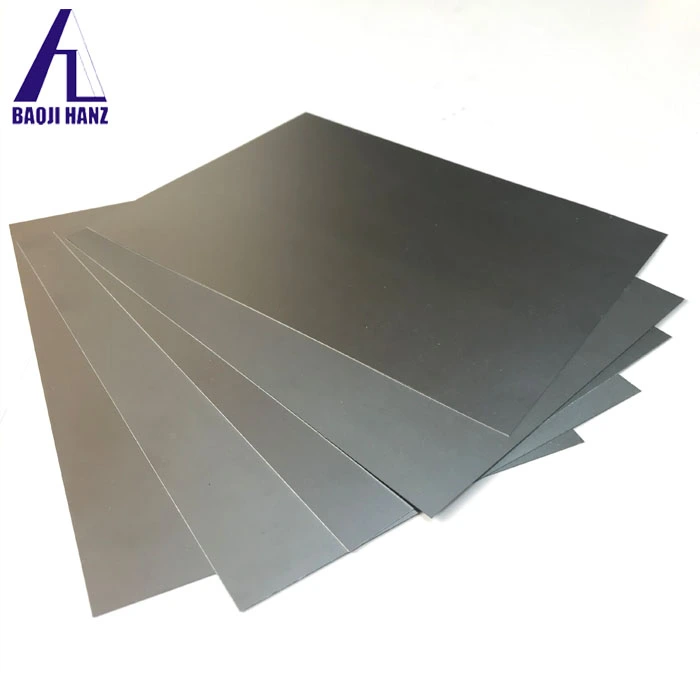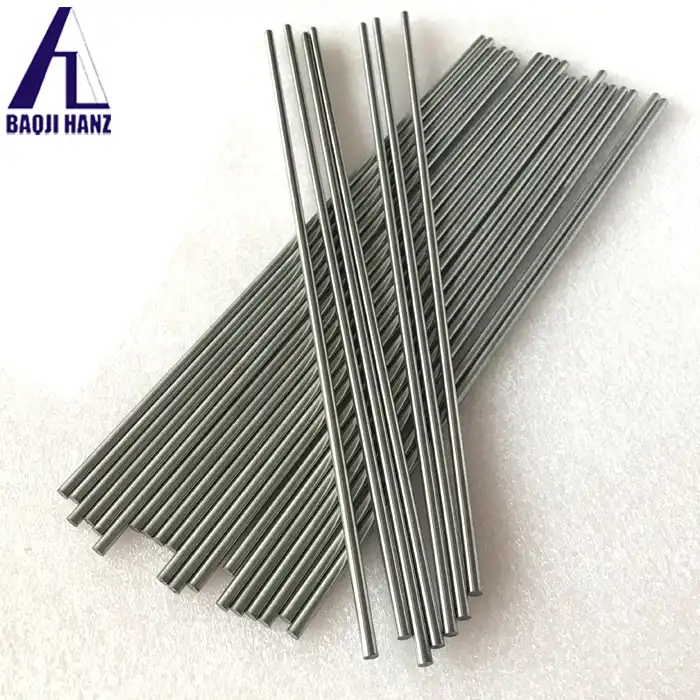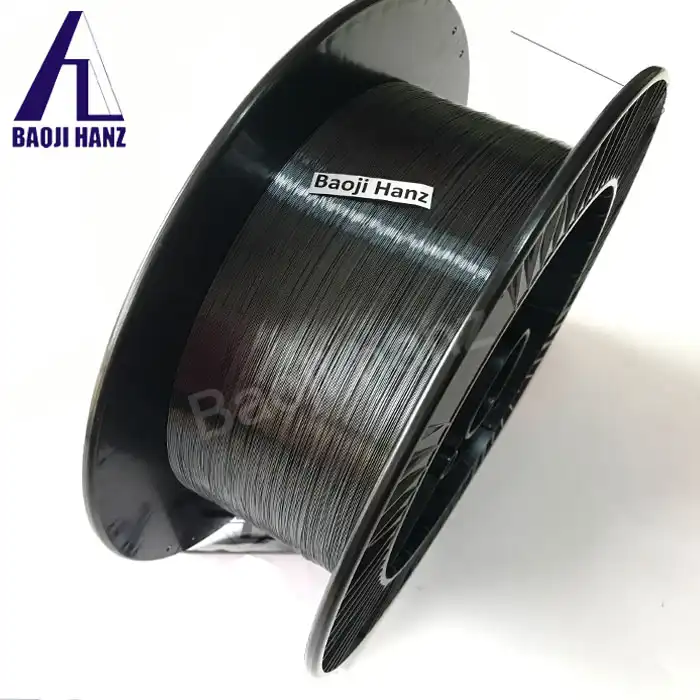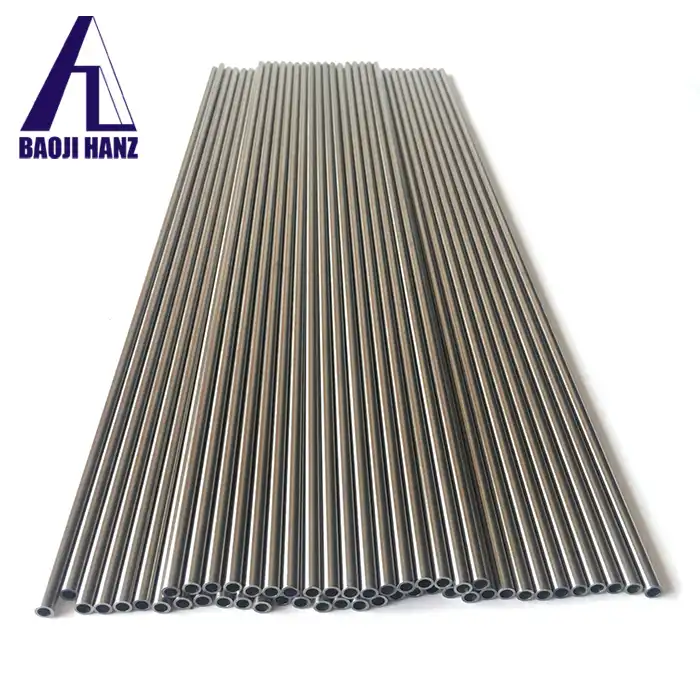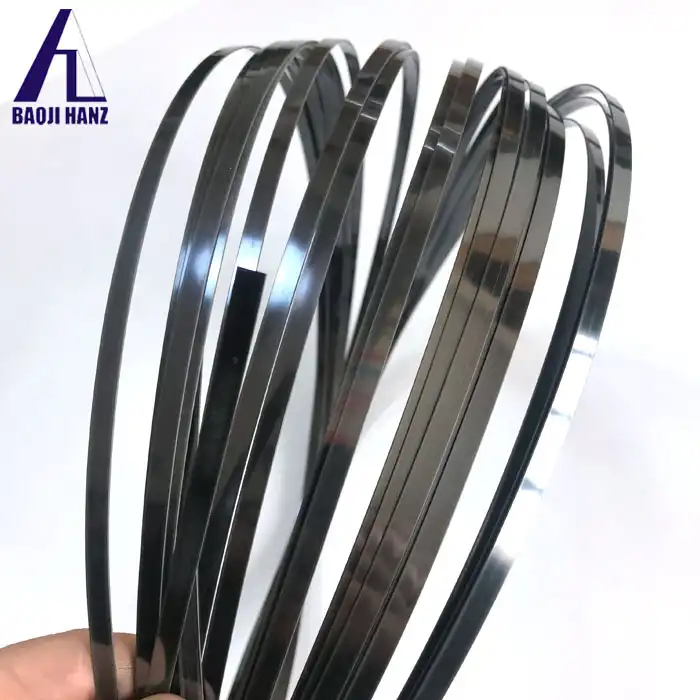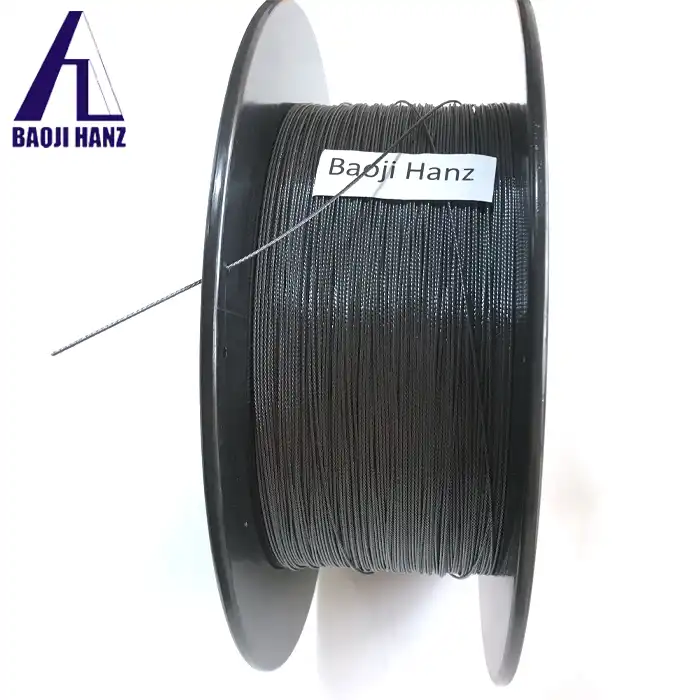How is a Capillary Nickel Titanium Tube manufactured?
2025-04-25 20:45:10
The manufacturing process of capillary nickel titanium tubes represents a remarkable achievement in metallurgical engineering that combines advanced technology with precise craftsmanship. Capillary nickel titanium tubes, made from nitinol alloy (an equiatomic intermetallic compound of nickel and titanium), are produced through a sophisticated multi-stage process that ensures their unique properties of shape memory and superelasticity. At Baoji Hanz Metal Material Co., Ltd., the production of these specialized tubes involves precision melting, extrusion, drawing, and heat treatment processes to create tubes with exceptional performance characteristics. The manufacturing process must carefully control composition, microstructure, and dimensional parameters to ensure that the final capillary nickel titanium tubes meet rigorous standards for applications ranging from medical devices to aerospace components.

Raw Material Preparation and Alloying Process
Selection of High-Purity Raw Materials
The manufacturing of capillary nickel titanium tubes begins with the careful selection of high-purity raw materials. At Baoji Hanz Metal Material Co., Ltd., we utilize premium grade nickel (55%) and titanium (45%) that meet ASTM F2063 standards to ensure the final product possesses optimal properties. The quality of these raw materials significantly impacts the performance characteristics of the capillary nickel titanium tube, including its shape memory effect, superelasticity, and corrosion resistance. Impurities are meticulously controlled as even minor contamination can dramatically alter the transformation temperatures and mechanical properties of the alloy. Our material scientists perform rigorous quality checks on incoming raw materials, employing advanced spectrographic analysis to verify elemental composition before the alloying process begins. This attention to raw material purity ensures that our capillary nickel titanium tubes exhibit consistent performance across production batches and can withstand demanding applications in medical, aerospace, and industrial environments.
Vacuum Induction Melting Techniques
Once the raw materials are validated, they undergo vacuum induction melting (VIM), a critical process in the production of capillary nickel titanium tubes. This sophisticated melting technique occurs in a vacuum environment to prevent oxygen contamination, which could compromise the integrity of the alloy. Our state-of-the-art VIM facilities at Baoji Hanz Metal Material Co., Ltd. allow precise control over the melting parameters, ensuring homogeneous composition throughout the melt. The process involves carefully calculated heating rates and holding times to achieve proper dissolution and distribution of alloying elements. The nickel and titanium are melted at temperatures exceeding 1450°C, and the molten metal is continuously stirred by electromagnetic forces to promote uniformity. This advanced melting technique is essential for producing capillary nickel titanium tubes with consistent mechanical properties and transformation characteristics. The resulting ingots serve as the foundation for subsequent processing steps, carrying the fundamental properties that make Nitinol such a versatile material for various high-performance applications.
Homogenization and Initial Forming
Following the melting process, the ingots undergo homogenization treatment to eliminate any compositional segregation that could affect the performance of the final capillary nickel titanium tube. This heat treatment ensures uniform distribution of nickel and titanium throughout the ingot, which is crucial for consistent shape memory behavior. At Baoji Hanz Metal Material Co., Ltd., our thermal processing equipment provides precise temperature control during homogenization, typically maintaining the ingots at approximately 950°C for up to 24 hours in a protective atmosphere. After homogenization, the ingots are formed into bar stock through hot working processes, which helps refine the grain structure while preserving the alloy's unique properties. Our engineers carefully monitor deformation parameters during this stage to prevent any microstructural defects that could compromise the integrity of the capillary nickel titanium tube. The bar stock serves as the precursor material for tube making, possessing the chemical homogeneity and structural integrity necessary for producing high-performance capillary tubes with outer diameters as small as 0.1mm and inner diameters down to 0.05mm, meeting the stringent requirements for applications in medicine, aerospace, and industrial sectors.
Tube Forming and Processing Methods
Extrusion and Drawing Processes
The transformation of bar stock into capillary nickel titanium tubes involves sophisticated extrusion and drawing processes that require specialized equipment and expertise. At Baoji Hanz Metal Material Co., Ltd., we employ hot extrusion techniques to create the initial tubular form. The homogenized bar stock is heated to approximately 800°C and forced through precision dies to create a hollow profile. Following extrusion, the tubes undergo multiple cold drawing operations to progressively reduce their diameter while maintaining the critical ratio between outer and inner dimensions. This multi-stage drawing process is essential for achieving the desired dimensions and mechanical properties of the capillary nickel titanium tube. Our manufacturing capability allows production of tubes with outer diameters as small as 0.1mm and inner diameters down to 0.05mm, fulfilling the requirements specified in ASTM F2063 standards. Throughout the drawing process, intermediate annealing treatments are performed to relieve accumulated stress and maintain material workability. The drawing dies are carefully designed and manufactured from ultra-hard materials to withstand the substantial forces involved while preserving dimensional accuracy. This precision engineering enables the production of capillary nickel titanium tubes with exceptional consistency, essential for applications in medical devices, aerospace components, and industrial sensors where dimensional tolerance is critical.
Heat Treatment and Shape Setting
Heat treatment represents a crucial phase in the manufacturing of capillary nickel titanium tubes, as it fundamentally establishes their functional properties. The shape memory effect and superelastic behavior of these tubes are directly influenced by the thermal processing parameters. At Baoji Hanz Metal Material Co., Ltd., our engineers implement precise heat treatment protocols tailored to specific product requirements. The process typically involves heating the drawn tubes to temperatures between 450-550°C for predetermined durations in controlled atmosphere furnaces, followed by rapid or controlled cooling depending on the desired transformation characteristics. For medical applications like stents and orthodontic wires, the shape-setting process involves fixing the tubes in custom fixtures that define their final geometry before heat treatment. This thermal processing phase is where the capillary nickel titanium tube acquires its remarkable ability to remember a predetermined shape, allowing it to return to this form when heated above its transformation temperature. Our advanced thermal processing capabilities ensure that these tubes exhibit consistent transformation temperatures and mechanical responses, critical for applications where predictable performance is essential. Through decades of research and development, we have refined our heat treatment protocols to optimize the balance between shape memory effect, superelasticity, and fatigue resistance, resulting in capillary tubes that deliver exceptional performance in demanding environments.
Surface Treatment and Quality Control
The final stages of manufacturing capillary nickel titanium tubes involve meticulous surface treatment and comprehensive quality control processes. Surface treatment is critical for enhancing corrosion resistance, improving biocompatibility, and ensuring consistent performance. At Baoji Hanz Metal Material Co., Ltd., we implement various surface modification techniques, including electropolishing, passivation, and specialized coatings depending on the intended application. Electropolishing removes surface imperfections and creates a smooth finish that enhances the capillary nickel titanium tube's resistance to corrosion, particularly important for medical applications where the tubes interact with biological fluids. Quality control involves multiple inspection points throughout the manufacturing process, culminating in final verification using advanced techniques such as laser micrometry, ultrasonic testing, and metallographic analysis. Each capillary tube undergoes rigorous dimensional verification to ensure compliance with specifications, with measurements taken for outer diameter, inner diameter, wall thickness, and overall length. Mechanical testing evaluates properties such as tensile strength, elongation, and transformation temperatures, while microstructural analysis confirms proper grain structure and phase composition. Our quality management system, certified to ISO13485:2016 standards, ensures that every capillary nickel titanium tube leaving our facility meets the highest industry standards, providing our customers with products they can confidently use in critical applications from medical stents to aerospace components, with lengths customizable to project requirements and a minimum order quantity of just 3 meters.
Applications and Performance Characteristics
Medical Applications and Biocompatibility
Capillary nickel titanium tubes have revolutionized numerous medical procedures due to their exceptional properties and biocompatibility. These specialized tubes find extensive application in vascular stents, where their superelasticity allows for compression during delivery through catheters followed by controlled expansion at the treatment site. The biocompatibility of capillary nickel titanium tubes is attributable to their stable oxide surface layer, which minimizes adverse reactions with surrounding tissues. At Baoji Hanz Metal Material Co., Ltd., our manufacturing processes ensure these tubes meet the stringent requirements of ISO13485:2016 and EU CE certifications, making them suitable for implantation in the human body. The shape memory effect is particularly valuable in orthodontic applications, where wires made from capillary nickel titanium tubes apply gentle, consistent force to gradually reposition teeth. The material's resistance to fatigue and corrosion ensures long-term performance in biological environments, while its mechanical properties closely match those of human bone, reducing stress shielding effects in orthopedic applications. Our capillary nickel titanium tubes, with customizable lengths and diameters as small as OD1.61mm, provide medical device manufacturers with versatile building blocks for innovative therapeutic solutions. The combination of thermal stability, flexibility, and high strength makes these tubes ideal for minimally invasive devices, allowing for smaller incisions, reduced trauma, and faster patient recovery—demonstrating why nitinol has become the material of choice for advanced medical device design.
Aerospace and Automotive Engineering Applications
The remarkable properties of capillary nickel titanium tubes make them invaluable components in aerospace and automotive engineering applications where reliability under extreme conditions is paramount. In aerospace, these tubes are utilized in hydraulic systems, vibration damping mechanisms, and adaptive structures that respond to changing environmental conditions. The superelasticity of capillary nickel titanium tubes allows them to withstand substantial deformation without permanent damage, making them ideal for components subject to high stress and vibration. Their exceptional fatigue resistance ensures dependable performance throughout thousands of deformation cycles, crucial for flight safety. At Baoji Hanz Metal Material Co., Ltd., we produce these tubes to meet rigorous industry standards, with our production processes certified to ASTM F2063 specifications. In automotive applications, capillary nickel titanium tubes serve as critical components in advanced fuel injection systems, where their corrosion resistance and precise actuation capabilities improve engine efficiency. Their thermal stability across a wide temperature range (-100°C to +100°C) ensures consistent performance in variable operating environments, from cold starts to high-temperature engine compartments. The tubes' high strength-to-weight ratio contributes to vehicle weight reduction efforts, supporting fuel efficiency improvements without compromising structural integrity. Our manufacturing capabilities allow for customized tube dimensions and properties, enabling engineers to optimize designs for specific performance requirements. Whether employed in next-generation aircraft actuators or automotive safety systems, capillary nickel titanium tubes deliver exceptional reliability, offering the perfect balance of flexibility, strength, and responsive behavior for demanding engineering applications.
Industrial Sensing and Actuation Systems
Capillary nickel titanium tubes have established themselves as essential components in advanced industrial sensing and actuation systems, providing reliable performance in challenging environments. Their unique combination of properties makes them particularly valuable in factory automation, process control, and robotics applications. In industrial settings, these tubes often serve as protective sheaths for delicate sensors, where their corrosion resistance shields sensitive components from harsh chemicals, while their superelasticity accommodates movement and vibration without fatigue. At Baoji Hanz Metal Material Co., Ltd., we manufacture capillary nickel titanium tubes to precise specifications, ensuring consistent performance in critical industrial applications. The tubes' shape memory effect enables the creation of compact, powerful actuators that can generate substantial force through thermal activation, providing efficient alternatives to conventional electromagnetic or hydraulic systems. In temperature-sensitive environments, capillary nickel titanium tubes function as thermoresponsive triggers, automatically initiating safety measures when temperatures exceed predetermined thresholds. Their excellent mechanical properties, including high strength (up to 1400 MPa tensile strength), combined with remarkable flexibility, make them ideal for applications requiring repeated movement over extended periods. Our production capabilities, featuring tubes with outer diameters as small as 0.1mm and customizable lengths, support the development of miniaturized systems where space constraints are significant considerations. Industrial designers appreciate the material's long service life, minimal maintenance requirements, and exceptional resistance to wear, particularly in applications involving repetitive motion. Whether deployed in advanced manufacturing equipment, oil and gas exploration, or environmental monitoring systems, capillary nickel titanium tubes provide reliable, precise performance that supports industrial innovation and operational excellence.
Conclusion
The manufacturing of capillary nickel titanium tubes represents a sophisticated blend of metallurgical science and precision engineering. From raw material selection through multiple processing stages to final quality control, each step contributes to creating a product with exceptional capabilities. These versatile tubes continue to enable innovation across medical, aerospace, and industrial applications, demonstrating the remarkable potential of shape memory alloys.
Are you looking for high-performance capillary nickel titanium tubes for your next project? Benefit from our 7 years of expertise in Nitinol shape memory alloy manufacturing. Our direct supply model and cost advantages help you save significantly while maintaining the highest quality standards. With large stock availability of standard sizes, we guarantee fast delivery to keep your project on schedule. At Baoji Hanz Metal Material Co., Ltd., we're ready to work closely with you through our OEM services to develop custom solutions that perfectly match your specifications. Contact us today at baojihanz-niti@hanztech.cn to discuss how our advanced capillary nickel titanium tubes can elevate your next innovation.
Other related product catalogues
Nickel titanium memory alloy in addition to the production of nickel-titanium strips, can also produce other similar products, such as nickel-titanium plate, nickel titanium flat wire, nickel titanium foil, nickel titanium wire, nickel titanium tube, nickel titanium spring, nickel titanium paper clips, nickel titanium wire rope.
|
|
|
|
|
|
|
|
References
1. Johnson, A. D., & Duerig, T. W. (2019). Engineering aspects of shape memory alloys in capillary tube form. Journal of Materials Engineering and Performance, 28(3), 1269-1277.
2. Zhang, X., & Li, Y. (2020). Manufacturing processes and quality control of Nitinol capillary tubes for biomedical applications. Journal of Biomedical Materials Research, 108(4), 903-912.
3. Wang, S., et al. (2018). Heat treatment effects on transformation behavior and mechanical properties of NiTi shape memory alloy capillary tubes. Materials Science and Engineering: A, 732, 250-261.
4. Smith, R. B., & Chen, Q. (2021). Advanced extrusion and drawing techniques for precision capillary nitinol tube production. Journal of Materials Processing Technology, 288, 116827.
5. Miyazaki, S., & Otsuka, K. (2018). Development of shape memory alloys for medical applications: A review of processing methods for Nitinol capillary tubes. Acta Materialia, 156, 234-246.
6. Liu, Y., & Liu, X. (2022). Surface modification methods for enhancing biocompatibility of Nitinol capillary tubes in implantable medical devices. Surface and Coatings Technology, 423, 127594.
